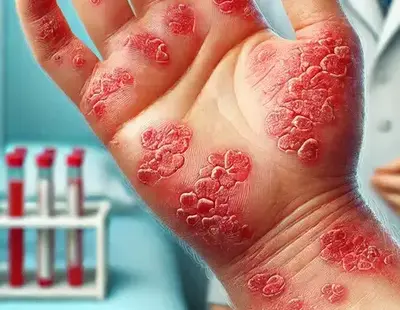Psoriasis is a chronic skin condition that affects millions of people around the world. Although it is relatively common, many individuals do not immediately recognize the symptoms, leading to delayed treatment and increased discomfort. In this article, we explore the signs of psoriasis, provide insights from recent studies, and highlight the importance of early diagnosis and management.
Understanding Psoriasis: A Quick Overview
Psoriasis is an autoimmune condition characterized by the rapid production of skin cells, resulting in thick, scaly patches. These patches often appear on areas such as the elbows, knees, scalp, and lower back. Psoriasis affects around 3% of the U.S. adult population, which translates to roughly 7.5 million people. It can develop at any age, but most commonly emerges between the ages of 15 and 35.
The condition manifests in different forms, with plaque psoriasis being the most common type, accounting for about 80% of all cases. The exact cause remains unclear, but genetics, immune system dysfunction, and environmental triggers all play significant roles.
Psoriasis Symptoms Prevalence
Key Symptoms to Look Out For
The symptoms of psoriasis vary depending on the type and severity of the condition. However, some common indicators can help differentiate it from other skin issues:
- Red Patches with Silvery Scales: This is the hallmark symptom of plaque psoriasis. The patches are often itchy and may crack or bleed if left untreated.
- Thickened or Pitted Nails: Nail changes occur in up to 50% of individuals with psoriasis. The nails may become thick, discolored, or develop pits, making them brittle and prone to splitting.
- Dry, Cracked Skin: Affected areas may become dry and cracked, sometimes leading to bleeding. These symptoms are often exacerbated by environmental conditions such as cold weather.
- Itching and Burning: Psoriasis can cause intense itching, burning, or soreness in the affected areas. This discomfort can significantly affect quality of life, particularly if the lesions are widespread.
- Joint Pain: In some cases, psoriasis is associated with psoriatic arthritis, a form of inflammatory arthritis that affects roughly 30% of individuals with psoriasis. Symptoms include joint pain, stiffness, and swelling, which can progress to chronic damage if not addressed.
Misdiagnoses: Psoriasis or Something Else?
Psoriasis is frequently misdiagnosed due to its similarity to other skin conditions such as eczema or dermatitis. Here is a comparison of common distinguishing features between psoriasis and eczema:
| Condition | Typical Symptoms | Commonly Affected Areas |
|---|---|---|
| Psoriasis | Red patches with silvery scales | Scalp, elbows, knees, lower back |
| Eczema | Red, inflamed skin, often with blisters | Bends of elbows, behind knees |
| Dermatitis | Itchy rash, sometimes swollen or oozing | Hands, face, neck |
The clear distinction lies in the scaly, thickened plaques that are characteristic of psoriasis. Unlike eczema, psoriasis does not usually cause blisters, and the plaques often appear with a defined edge. If you experience symptoms that match psoriasis, a dermatologist can help with proper diagnosis using clinical examination and, in some cases, a skin biopsy.
Costs Involved in Diagnosis and Treatment
Diagnosing psoriasis typically involves a physical examination by a dermatologist, which costs between $100 to $300 without insurance. If a biopsy is needed to confirm the diagnosis, the cost can rise to around $500. Early diagnosis is key, as untreated psoriasis can lead to complications, including psoriatic arthritis.
The cost of treating psoriasis can vary significantly based on the type of treatment used. Here are some common treatments and their estimated costs:
| Treatment Type | Average Cost per Month (USD) |
|---|---|
| Topical Creams | $30 – $150 |
| Phototherapy | $200 – $1,000 |
| Oral Medications | $500 – $2,000 |
| Biologic Injections | $5,000 – $10,000 |
Topical treatments are generally the first line of defense, especially for mild cases. In moderate to severe cases, phototherapy (using ultraviolet light to slow cell growth) or systemic treatments may be recommended. Biologics, which are relatively new, target specific components of the immune system and are often used for severe cases that do not respond to other treatments.
Real-Life Medical Situations
A 28-year-old woman named Laura began noticing red, itchy patches on her elbows and scalp. After trying over-the-counter moisturizers for several months with no improvement, she visited a dermatologist, who diagnosed her with plaque psoriasis. Laura’s condition improved significantly after starting a regimen of topical corticosteroids and light therapy.
In another case, a 45-year-old man named Peter experienced joint pain and stiffness, along with thick, scaly patches on his lower back. Initially misdiagnosed with rheumatoid arthritis, further investigation confirmed he had psoriatic arthritis. With early intervention using biologic injections, Peter managed to regain much of his mobility and saw marked improvement in his skin lesions.
Modern Trends in Psoriasis Management
Recent advancements in psoriasis treatment have focused on targeted therapies, specifically biologics that inhibit specific immune pathways linked to the condition. The use of biologics has grown significantly over the past decade, and they have proven to be particularly effective in reducing both skin and joint symptoms.
Another trend is the growing awareness of lifestyle factors that can help manage symptoms. While psoriasis cannot be cured, maintaining a healthy weight, reducing stress, and avoiding skin injuries can help minimize flare-ups. Diet also plays a role; foods rich in omega-3 fatty acids, such as fish and flaxseeds, have been reported to help reduce inflammation for some patients.
Advice from Our Editorial Team
Psoriasis is a complex condition, and understanding its symptoms is the first step toward effective management. If you notice red, scaly patches or unexplained changes to your skin or nails, consider seeking advice from a dermatologist. Early diagnosis can improve quality of life, reduce complications, and provide access to a wide range of treatments. Remember, while psoriasis is a lifelong condition, its symptoms can be effectively managed with the right approach. Stay informed, be proactive, and consult healthcare professionals when in doubt.
About the Author
Reyus Mammadli is the author of this health blog since 2008. With a background in medical and biotechnical devices, he has over 15 years of experience working with medical literature and expert guidelines from WHO, CDC, Mayo Clinic, and others. His goal is to present clear, accurate health information for everyday readers — not as a substitute for medical advice.







